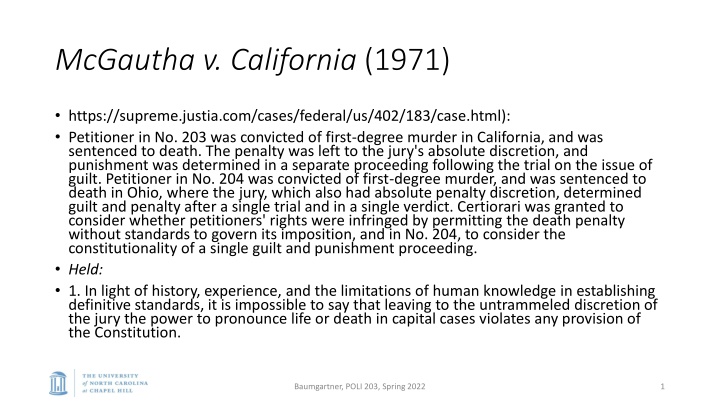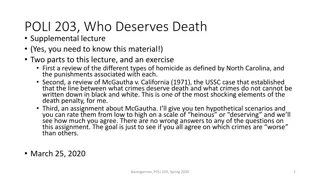
Landmark Case of McGautha v. California (1971) Regarding Death Penalty Standards
In the case of McGautha v. California (1971), the Supreme Court addressed the issues of death penalty imposition without specific standards and the constitutionality of a single guilt and punishment proceeding. The majority opinion, as articulated by Justice Harlan, highlighted the complex nature of defining criteria for capital punishment due to the diverse considerations involved in assessing culpability. The case raised questions about human capacity to establish definitive standards for pronouncing life or death in capital cases. Explore the implications of untrammeled jury discretion in determining penalties and the challenges of predefining characteristics warranting the death penalty.
Download Presentation

Please find below an Image/Link to download the presentation.
The content on the website is provided AS IS for your information and personal use only. It may not be sold, licensed, or shared on other websites without obtaining consent from the author. If you encounter any issues during the download, it is possible that the publisher has removed the file from their server.
You are allowed to download the files provided on this website for personal or commercial use, subject to the condition that they are used lawfully. All files are the property of their respective owners.
The content on the website is provided AS IS for your information and personal use only. It may not be sold, licensed, or shared on other websites without obtaining consent from the author.
E N D
Presentation Transcript
McGautha v. California (1971) https://supreme.justia.com/cases/federal/us/402/183/case.html): Petitioner in No. 203 was convicted of first-degree murder in California, and was sentenced to death. The penalty was left to the jury's absolute discretion, and punishment was determined in a separate proceeding following the trial on the issue of guilt. Petitioner in No. 204 was convicted of first-degree murder, and was sentenced to death in Ohio, where the jury, which also had absolute penalty discretion, determined guilt and penalty after a single trial and in a single verdict. Certiorari was granted to consider whether petitioners' rights were infringed by permitting the death penalty without standards to govern its imposition, and in No. 204, to consider the constitutionality of a single guilt and punishment proceeding. Held: 1. In light of history, experience, and the limitations of human knowledge in establishing definitive standards, it is impossible to say that leaving to the untrammeled discretion of the jury the power to pronounce life or death in capital cases violates any provision of the Constitution. Baumgartner, POLI 203, Spring 2022 1
Some quotes from Justice Harlans majority opinion To identify before the fact those characteristics of criminal homicides and their perpetrators which call for the death penalty, and to express these characteristics in language which can be fairly understood and applied by the sentencing authority, appear to be tasks which are beyond present human ability. Baumgartner, POLI 203, Spring 2022 2
Justice Harlan continues Thus, the British Home Office, which, before the recent abolition of capital punishment in that country, had the responsibility for selecting the cases from England and Wales which should receive the benefit of the Royal Prerogative of Mercy, observed: "The difficulty of defining by any statutory provision the types of murder which ought or ought not to be punished by death may be illustrated by reference to the many diverse considerations to which the Home Secretary has regard in deciding whether to recommend clemency. No simple formula can take account of the innumerable degrees of culpability, and no formula which fails to do so can claim to be just or satisfy public opinion." Baumgartner, POLI 203, Spring 2022 3
He continues: no finite list of mitigators possible. States are entitled to assume that jurors confronted with the truly awesome responsibility of decreeing death for a fellow human will act with due regard for the consequences of their decision and will consider a variety of factors, many of which will have been suggested by the evidence or by the arguments of defense counsel. For a court to attempt to catalog the appropriate factors in this elusive area could inhibit, rather than expand, the scope of consideration, for no list of circumstances would ever be really complete. The infinite variety of cases and facets to each case would make general standards either meaningless "boiler-plate" or a statement of the obvious that no jury would need. Baumgartner, POLI 203, Spring 2022 4

